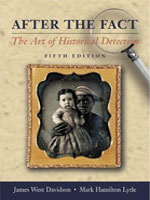Can You Recommend Three Texts on Historiography?
Question

If you could recommend no more than three college level (undergrad/grad) texts on historiography and historical methodology, what would they be?
Answer
Let me suggest three very different kinds of texts. I would also recommend that you peruse the book shelves of a good university library in the vicinity of call numbers beginning with "D 13" and "D 16." You will find dozens of texts, many of them recently published, that may better serve your needs.
The three I recommend are:
Allan Megill, with contributions by Steven Shepard and Phillip Honenberger, Historical Knowledge, Historical Review: A Contemporary Guide to Practice (Chicago: University of Chicago Press, 2007).
James West Davidson and Mark Hamilton Lytle, After the Fact: The Art of Historical Detection, 5th ed., with Primary Source Investigator CD (New York: McGraw-Hill, 2004). 2 volumes.
Georg G. Iggers and Q. Edward Wang, with the assistance of Supriya Mukherjee, A Global History of Modern Historiography (Harlow, England; New York: Pearson Longman, 2008).
Megill's book is a collection of essays—many of which had been published in different forms over the past 20 years—that addresses the question, "What grounds do we have for accepting the accounts of the past that historians and others offer to us?" The author more succinctly characterizes this inquiry as "How can we best avoid historiographical error?"
The interrelated essays seek "to alert (or re-alert) practicing historians—and especially beginners—to the epistemological aspect of their practice." Megill warns his readers that four of the 10 chapters are "weighty"; the collection, thus, may work best with graduates and upper-level undergrads who seriously are considering graduate school.
Megill carefully distinguishes between four "tasks of history-writing": description, explanation, argument or justification, and interpretation—and offers a rigorously argued case study that employs the principle of "inference to the best explanation" as a guide for judging historical argumentation.
The book also addresses issues of objectivity, memory, identity, narrative, historiographical fragmentation, and the new cultural history. I would suggest that students work through the chapters slowly and carefully in order to absorb its potentially long-lasting lessons.
Davidson and Lytle's After the Fact offers an "apprentice approach to history" through 18 case studies that explore a variety of approaches to historical investigation. (Chapter titles can be found online). The CD includes hundreds of primary sources students could use for research papers, in addition to three chapters from previous editions not included in the main text.
The authors emphasize the process of doing history and the need for historians to craft a good story. Their examinations of diverse historical problems—covering events from the colonial period to the recent past—and historiographical issues exploring a wide range of types of history will expose beginning students to the sophisticated inquiries that professional historians address when they confront historical problems.
Iggers, Wang, and Mukherjee have produced one of the first studies of historiography to take a global approach. Covering developments and interactions in history writing during the past two centuries, the authors also address diverse roots of historiographies going back to ancient times. They seek to integrate historiographies both Western and non-Western into broader societal frameworks and to offer a comparative approach.
Chapters examine major trends of history writing throughout the world, often focusing on nationalistic purposes and efforts to escape the nation's pull. Recent trends in transnational, world, and global history are well covered.
